Dessert Taxonomy
An attempt at understanding why throat lozenges are listed in the "Dessert" section on Wikipedia
Welcome to Deep Dives, a bi-monthly subsection of TMI! Here, I dive deeper into my thoughts about a topic that doesn’t fit in the weekly newsletter.
Last week I was doing some research about dessert types for a piece I’m working on, and as I scrolled through the “List of Desserts” section of Wikipedia, I noticed this:
I’m sorry. What?
THROAT LOZENGES? Are a dessert?
I am befuddled. This is: no. Absolutely not.
Desserts taste good and are bad for you. Medicine tastes like shit and is good for you. This is a universal truth, right?
Here is the definition of a throat lozenge, as per Wikipedia:
A throat lozenge (also known as a cough drop, sore throat sweet, troche, cachou, pastille or cough sweet) is a small, typically medicated tablet intended to be dissolved slowly in the mouth to temporarily stop coughs, lubricate, and soothe irritated tissues of the throat (usually due to a sore throat or strep throat), possibly from the common cold or influenza. Cough tablets have taken the name lozenge, based on their original shape, a diamond.
And here is their definition of dessert:
Dessert is a course that concludes a meal. The course consists of sweet foods, such as candy, and possibly a beverage such as dessert wine and liqueur. … The term dessert can apply to many sweets, such as biscuits, cakes, cookies, custards, gelatins, ice creams, pastries, pies, puddings, macaroons, sweet soups, tarts, and fruit salad.
WHERE IS THE CROSSOVER HERE?
Is it literally the word “sweet”? Because sure, lozenges do have some sugar in them, but that’s only to counteract all this burn-and-tingle-flavored jazz:
Lozenges may contain benzocaine, an anaesthetic, or eucalyptus oil. Non-menthol throat lozenges generally use either zinc gluconate glycine or pectin as an oral demulcent. Several brands of throat lozenges contain dextromethorphan.
Other varieties such as Halls contain menthol, peppermint oil and/or spearmint as their active ingredient(s). Honey lozenges are also available.
Okay. Maybe we’re inching into some crossover here with the peppermint oil/spearmint vibes. Unfortunately, all that’s doing is giving me flashbacks to my why TF are mints classified as candy breakdown. Because, again — mints are for breath (and apparently, coughs). Certainly not a “course that concludes a meal.”
There’s also honey, which I’ll concede could be venturing into hard candy territory. But a cursory glance of every brand listed on Wikipedia that I’ve actually heard of before (to be fair, this is fairly extensive since I grew up working in my family’s pharmacy) shows only one has a honey flavored lozenge that doesn’t also feature herbs (e.g., Ricola) or menthol (e.g., Cepacol, Halls).
Herbs? Menthol? Eucalyptus oil? I’m really failing to see any of this as enjoyable. If I went on Willy Wonka’s factory tour, saw the Chocolate Room, rushed down the stairs, shook a tree, and the first thing I got was a Sucrets, I’d jump into the chocolate river and go up the vacuum tube myself.
I wouldn’t even care what horrible song the Oompa Loompas made up about me. I don’t need to get to the Everlasting Gobstopper room if I have to eat a Sucrets to get there. Dump me off outside and let me reconvene with Slugworth. I’ve had enough.
Have you ever tasted a fucking Sucrets? Absolutely nothing about it is enjoyable, from beginning to end. They taste like cherry tinged nuclear fallout.
I don’t even want them if I’m having the worst coughing fit of my life. I’d rather break 3 ribs and never sleep again.
Sucrets are a threat to a democratic society.
And just look at the packaging!
Have you ever gotten a dessert out of a fucking blister pack? This is medicine!!
Every cookie would be completely destroyed if you tried to punch it through aluminum foil. Worthless.
Then there’s Ricola, which touts its “Original Swiss Herb” flavor, and…they still include menthol. What are these “Swiss herbs,” exactly? Well, Wikipedia tells me they’re elder, horehound, mallow, peppermint, sage, thyme, cowslip, burnet, yarrow, marsh mallow, lady’s mantle, speedwell, and ribwort plantain.
Calm down, Professor Sprout. Do y’all do all your manufacturing by cauldron, too?
Honestly though, that list sounds like something I’d love to get in a trifle. Do you guys also serve dextromethorphan-filled cream puffs? I’ve been craving a croquembouche of cough-suppressing delight. What about menthol macarons? Benzocaine bonbons?
Also, I’d like to note that some of those herbs are native to Southern Europe, not Northern. How did those become “Swiss herbs”?? 🧐 ATTENZIONE, PICKPOCKET!!
And HALLS??
In the cough suppressant system, menthol-based offenses are considered especially heinous…These are their lozenges. BONG BONG!
Here’s a fun little tidbit from Wikipedia:
In some parts of the world, including Brazil, Argentina, Peru, Ecuador, Colombia, the Philippines, and Pakistan, Halls is advertised as a mentholated hard candy and is not recognised as a medicine for coughs. In the UK, Halls Extra Strong has recently dropped all mention of an active ingredient (or of coughs) from the packaging, and now describes the contents as "Extra Strong Original flavour hard boiled sweets."
“HARD BOILED SWEETS?” Are there yolks? Is that what the “syrup center” is?
Truly, though — who among us would purchase Halls if not in an act of complete desperation? Mentho-lyptus flavored hard candy? If someone buys this on their own, like for a treat, they need to go to jail. I’m sorry, but this is serial killer behavior.
Now — there is, as always, one singular exception to the rule: Luden’s.
Earlier I mentioned that there was one brand that made “honey” lozenges without herbs or menthol, and this is it. Their active ingredient is Pectin, which basically just creates a protective layer over irritated spots in your throat.
Pectin is a flavorless additive. And who among us hasn’t eaten a bunch of AirHeads and then suddenly discovered a protective layer of gunk in their throat?
Luden’s are definitely candy, which makes them a dessert. Check out all these flavors:
You can literally buy them online at a place called “The Wholesale Candy Shop.”
(These are, unsurprisingly, my favorite cough drop — even if they don’t really do much other than turn my tongue red (Wild Cherry is the only flavor I’ve tried). But — I do not keep them around the house as treats. I only buy them when I’m sick, which continues to lend credence to the “throat lozenges are medicine” theory.)
Anyway, just perusing a bit further down the Throat Lozenge page and I —
*I will not fall into this trap today. I will not fall into this trap today.*
Perhaps it is time to convene with the knower of all things, ChatGPT.
WELL, WELL, WELL.
I have to say: the fact that ChatGPT is able to give me a very strong answer on this that is not “desserts are what you make them”/ “it is up to personal opinion” is a real victory.
That settles it. Even the robots are on my side here.
Bonus Dive: The Etymology of The Word Lozenger
Me: *reads “throat lozenge”*
My brain: throat lozengeR hehehhe
Growing up in Texas, “lozenger” was a common pronunciation that I heard regularly, mostly from older folks. Obviously the word lozenge does not have an R on it, so I wanted to know where exactly that came from.
The Grammarphobia Blog has a ton of relevant information, including that the Oxford English Dictionary describes “lozenger” as part of a regional dialect.
Interestingly, they also mention:
The Dictionary of American Regional English says the variant is present in various parts of the US, though chiefly in the Northeast.
Although most DARE examples of the usage are from New England and the Middle Atlantic states, the regional dictionary has quite a few citations from other parts of the US, including Alabama, Georgia, Maryland, and Ohio.
The DARE editors suggest that the American usage may have crossed the pond with speakers of Scottish English and regional dialects in England.
Kind of wild that there’s crossover on this one between the Northeast and the South, but I guess if it all came from UK immigrants, that might make sense if they settled in all those spots.
Also, there’s this little tidbit:
However, Oxford has only one written example of this early usage, from a 1527 will in which the word is spelled “losinger.”
Which feels most accurate, because whoever says “lozenger” IS a total “losinger”.
I will go to my grave knowing that Wikipedia is wrong on this.
But just in case: what delicious, cough-suppressing dessert will you be enjoying this evening?






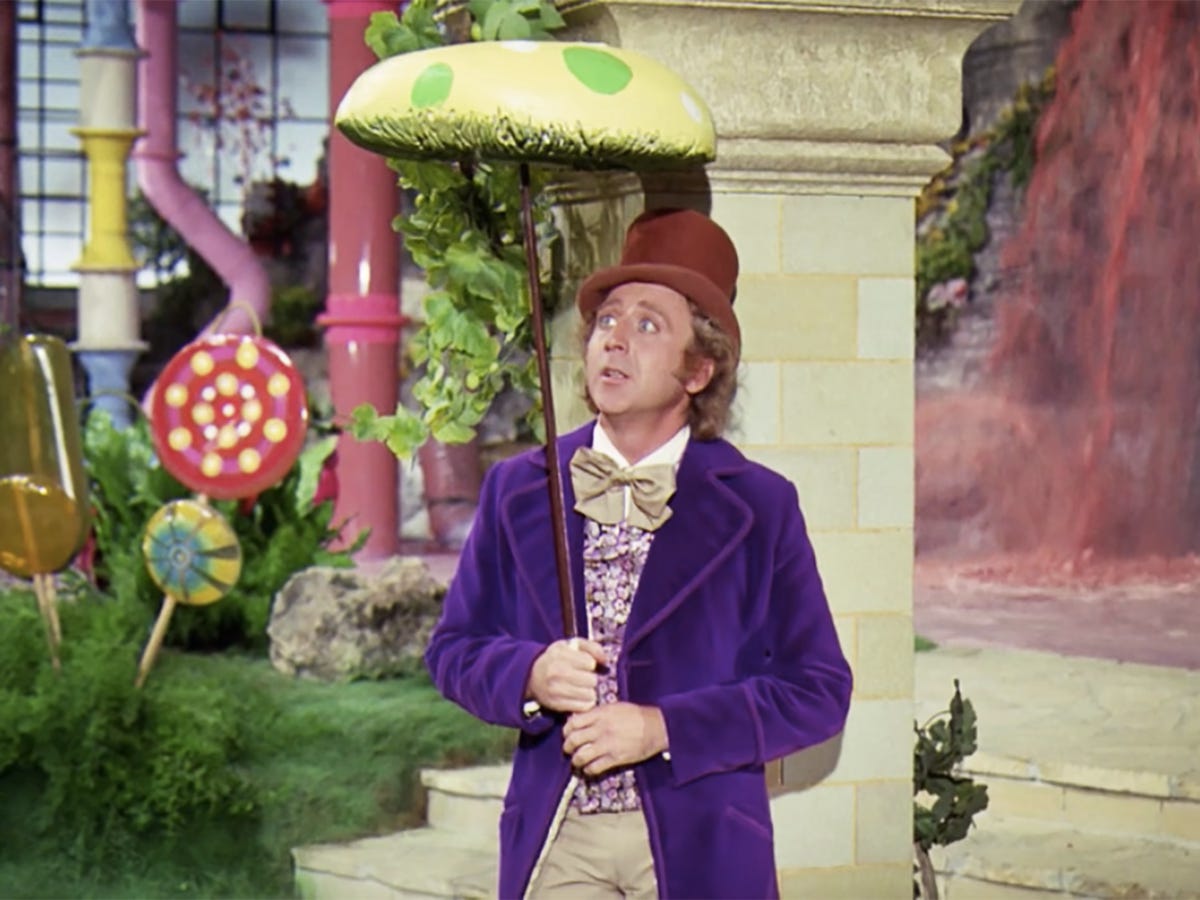

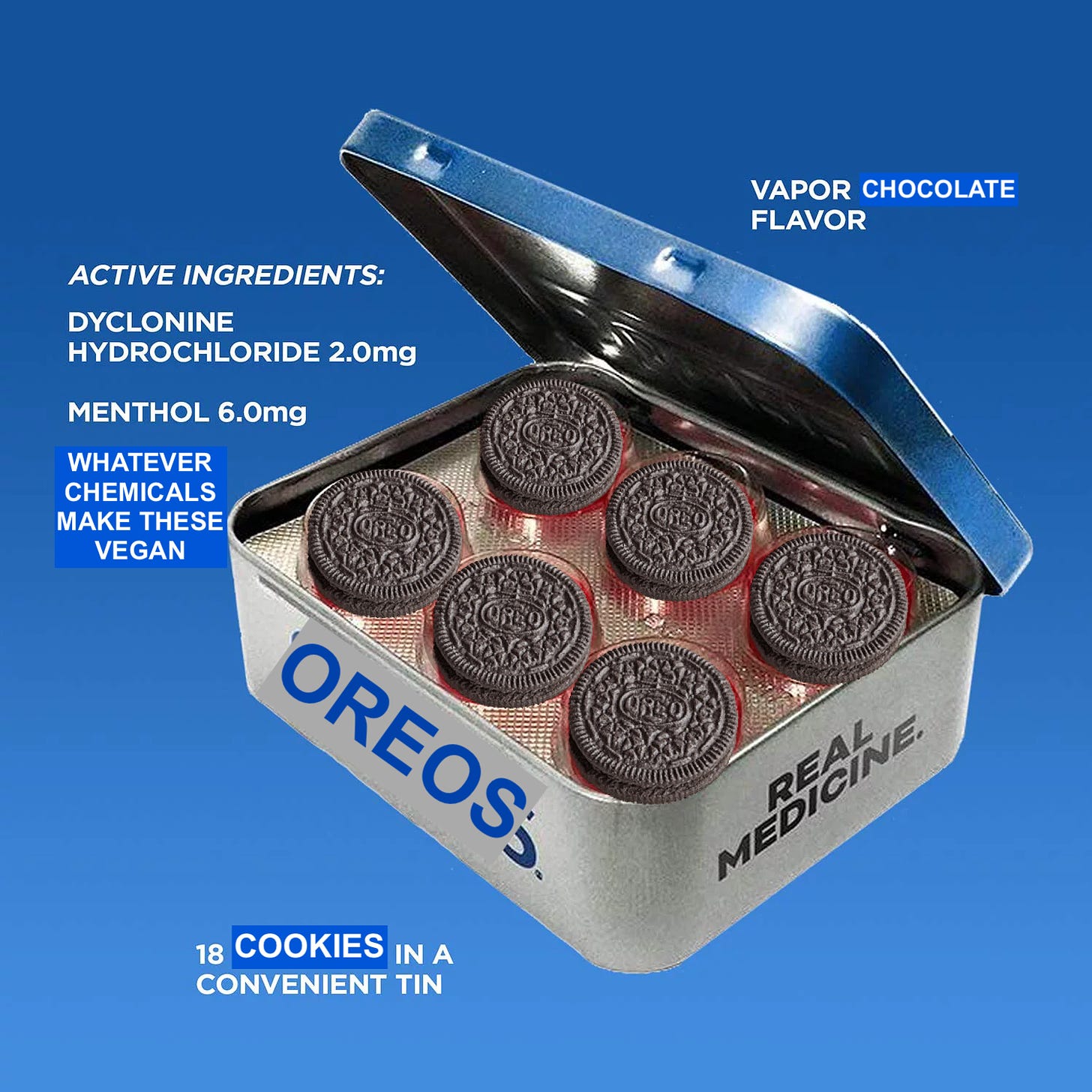

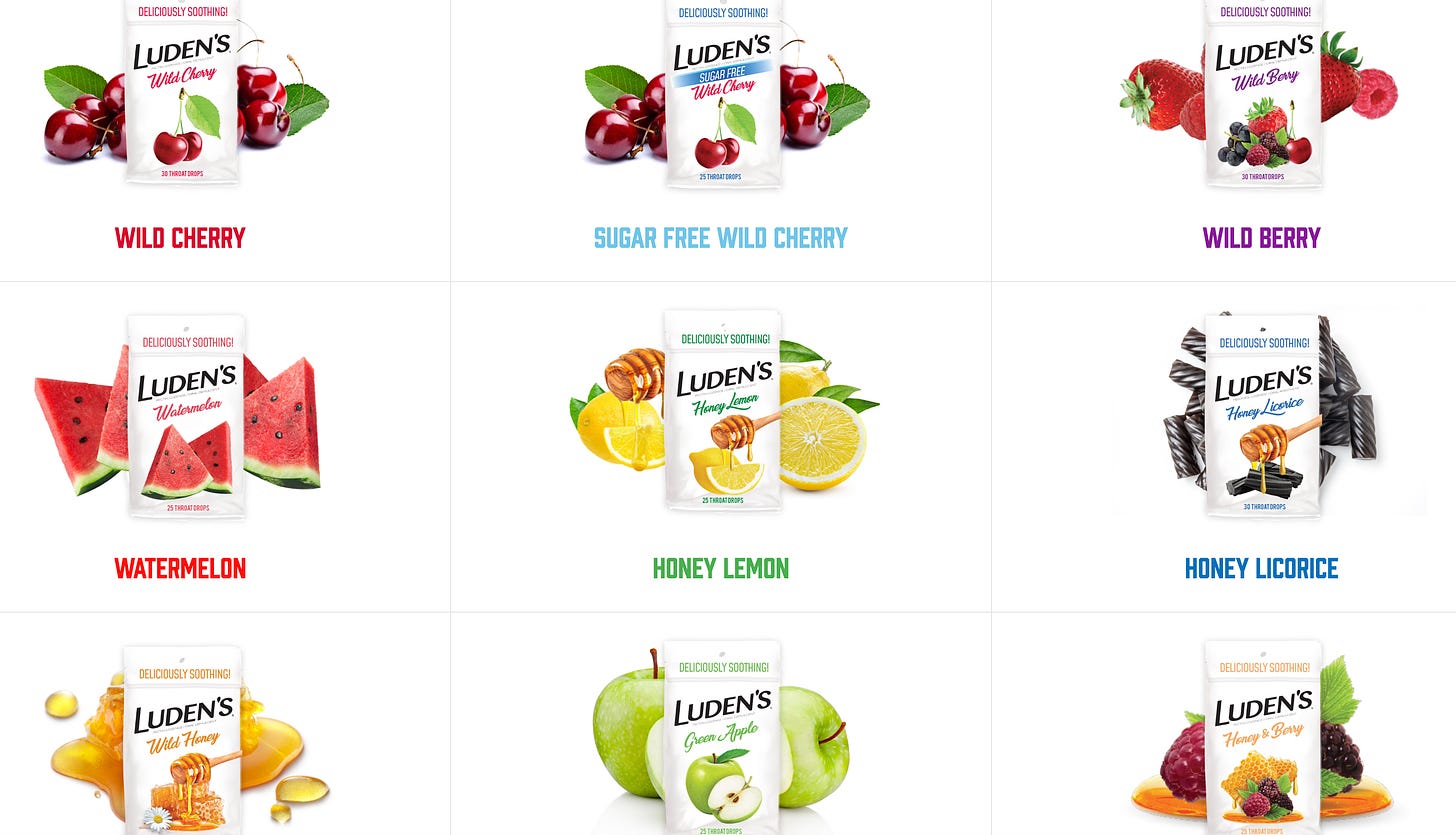
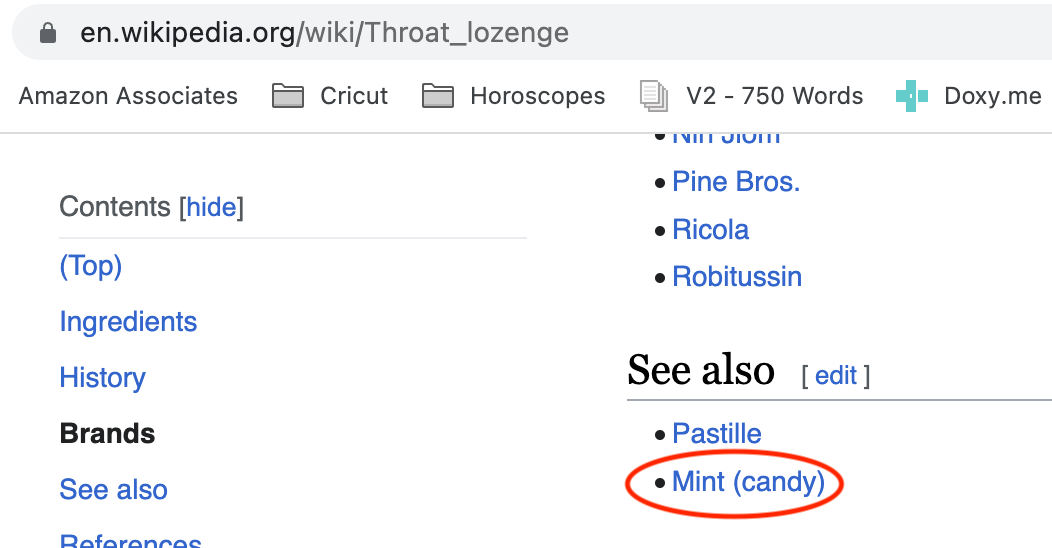

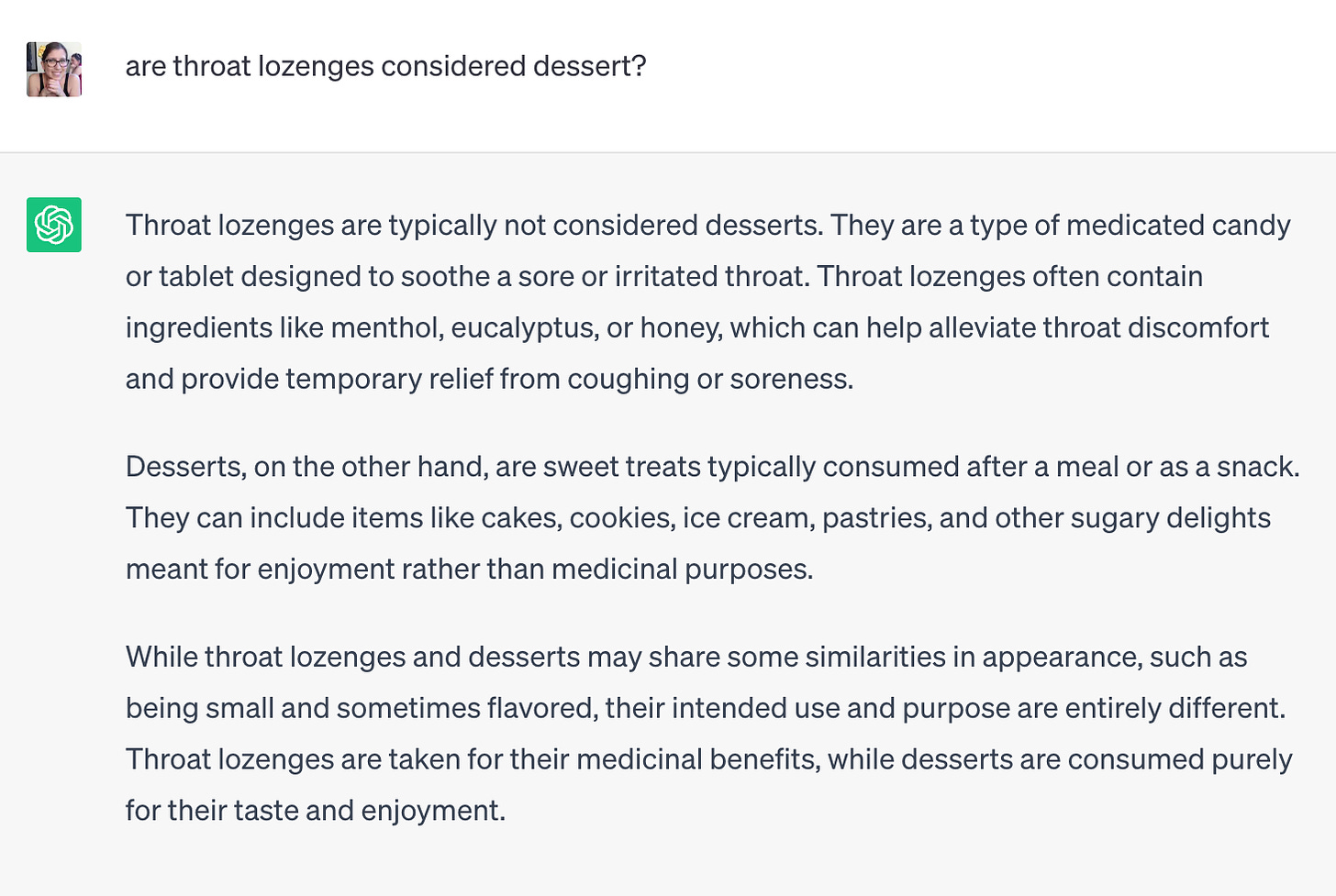
Truly a commendable Wikipedia rabbit hole oh my goodness!!